Legal Considerations
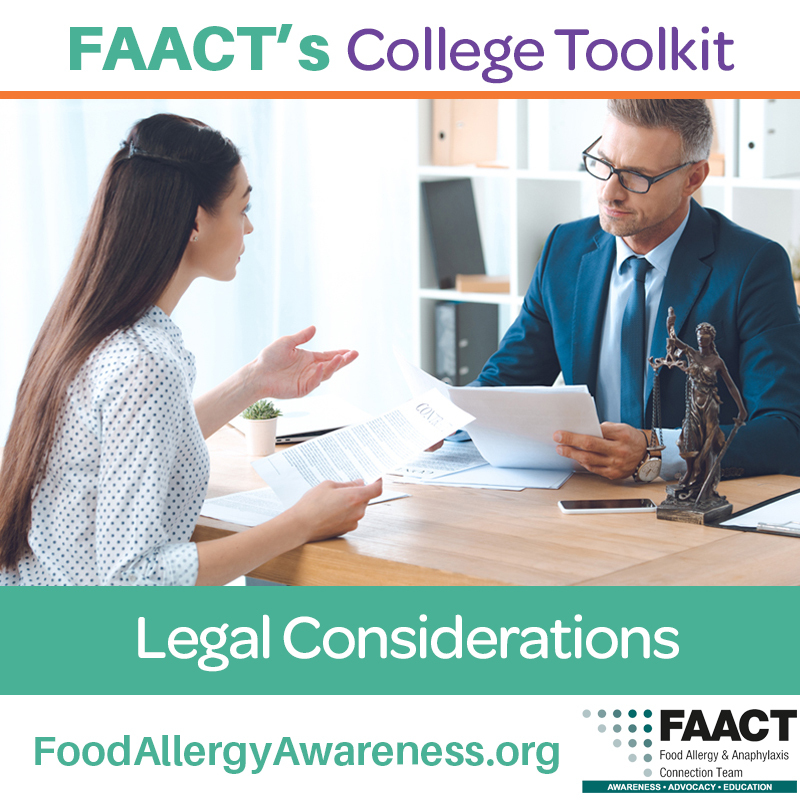
Legal Considerations
Understanding your civil rights and legal considerations supports a smooth transition to college.
Important areas of consideration include:
- Dining services
- Housing accommodations
- Legal documents that may need to be prepared to allow parents access to an adult student's:
- Medical records
- Financial records
- Academic records
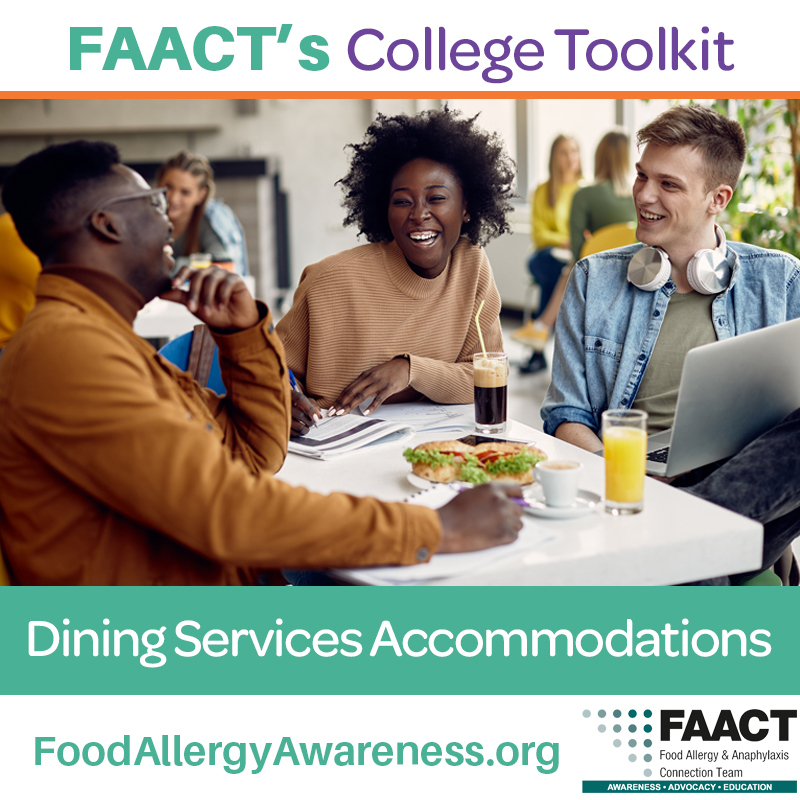
Dining Services Accommodations
One important and unique area of accommodations in the college setting is dining services. Title II and Title III of the Americans with Disabilities Act (ADA) prohibit schools from discriminating against students with disabilities, including students with food allergies. ADA also requires that schools provide students with disabilities reasonable accommodations necessary for these students to have full and equal access to the school’s services, facilities, accommodations, and goods, including food services and meal plans.
There are several areas in which campus food services can be problematic for people with food allergies. Some schools require students living on campus to purchase a meal plan, regardless of whether the on-campus facilities can safely serve all students. Some schools outsource the responsibilities for food services to an outside vendor – a separate company hired to run the school’s dining halls – and rely on the vendor’s protocols for food safety. Additionally, some schools may not properly train dining service staff on accommodating students with food allergies. All of these issues have been addressed recently by the U.S. Department of Justice (DOJ).
The U.S. Department of Justice entered into settlement agreements with Lesley University and Rider University regarding allegations that these universities and their food service and meal plan policies discriminated against students with food allergies in violation of Title III of the ADA. The agreements required the schools to modify their dining services to accommodate students with food allergies.
Lesley University had a requirement that all students living on campus pay for a meal service plan, regardless of the ability of students with food allergies and celiac disease to safely eat the food provided. Without admitting to a violation of the ADA, Lesley University entered into a voluntary settlement agreement with the U.S. Department of Justice that requires Lesley University to modify its meal service plan so that students with food allergies can safely participate in meals served. Lesley University was also required to consider exempting from the mandated meal plan purchase students who, due to a disability, cannot fully utilize the meal services plan. The settlement agreement between DOJ and Lesley University also required Lesley University to train dining service staff on how to properly accommodate students with food allergies, post warning notices regarding allergens in food items that contain allergens, offer safe food items to students with food allergies, allow food allergic students to pre-order safe meals from dining services, and provide a separate area to store safe foods and prepare safe meals.
Rider University relied on the limited policies of its food service vendor, which failed to appropriately accommodate a student with celiac disease. It also failed to appropriately train its food service staff to safely accommodate students with food allergies. Without admitting to violating the ADA, Rider University entered into a voluntary settlement agreement with DOJ that requires the university to make structural changes to its food services to provide allergen-free food preparation areas in dining facilities, create a pre-order option for students with food allergies, and employ a full-time dietician to advise and assist with addressing issues related to food allergies.
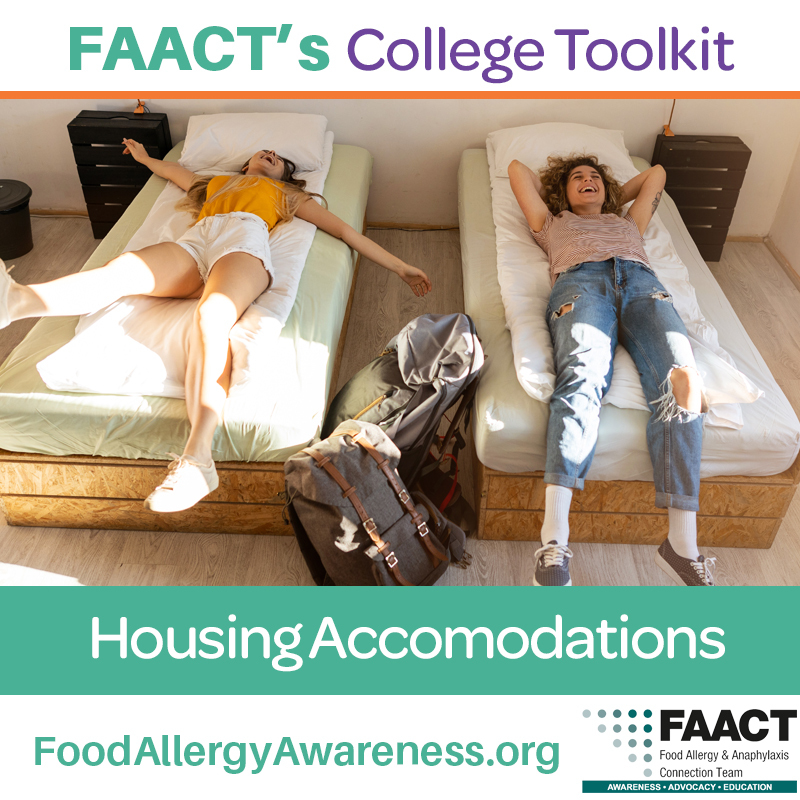
Housing Accommodations
Another area of accommodations unique to the college and university setting is student housing. Just as students with disabilities have a legal right to fully and equally enjoy the dining services offered by a school, the ADA language requiring schools to provide students with disabilities reasonable accommodations necessary to have full and equal access to school services, facilities, accommodations, and goods also ensures that students with food allergies have the right to reasonable accommodations for housing.
While many students with food allergies find that regular housing options are appropriate or can be made appropriate with proper roommate assignments and agreements/rules regarding allergens, other students may need a single room (often called a “medical single”) based on the recommendation of their medical provider.
The U.S. Department of Education, New York Office for Civil Rights (OCR), determined that a school cannot charge a student an additional fee for a “medical single” necessitated by a disability. OCR determined in a Compliance Resolution to a complaint filed against the State University of New York (SUNY) at Potsdam that if a student requires and is provided a “medical single” housing option, under Section 504 of the Rehabilitation Act of 1973 and Title II of the ADA, the college or university may not impose a “surcharge” on the individual with a disability for this necessary accommodation and the student should be charged the rate for the “standard” housing (typically a double room). Although this SUNY student’s disability was not a food allergy, OCR found that SUNY had violated the ADA by charging an additional fee or “surcharge” to other disabled students who required medical single rooms.
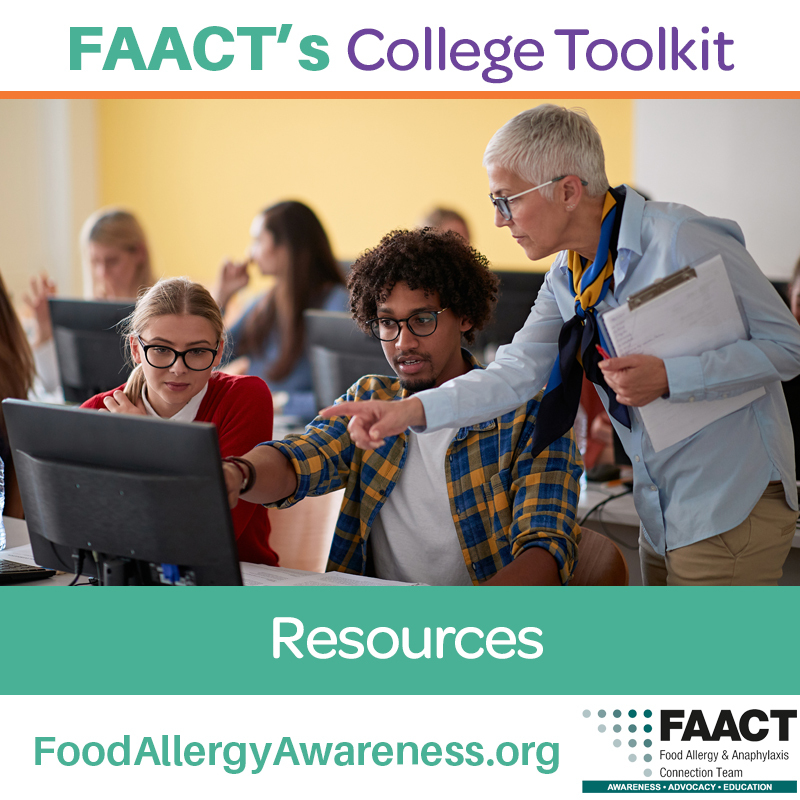
Resources
IMPORTANT NOTE: Although the Lesley University settlement, Rider University settlement, and SUNY Compliance Resolution are agreements and opinions of executive agencies and are based on the specific facts of the individual complaints and cannot be considered binding legal precedence, they have garnered the attention of colleges and universities across the country, many of which are modifying their policies to meet the terms of these resolutions. Additionally, these resolutions reference the applicable laws and legal standards that govern the appropriate accommodations for disabilities, including food allergies, and can be useful if your student is facing similar challenges at school.
- The food service industry’s food allergy expert, MenuTrinfo®, partnered with the nation’s leading food allergy education and advocacy group, the Food Allergy & Anaphylaxis Connection Team (FAACT), to make serving people with food allergies safer. Together, FAACT and MenuTrinfo® are providing leading-edge food allergy education, risk-reduction strategies, and emergency preparedness plans to food service facilities so they can safely serve people living with food allergies as well as their families, friends, and colleagues.
MenuTrinfo’s AllerTrain™ program, which was launched in 2011 and accredited by the American National Standards Institute (ANSI) in 2014, is the leading allergy education platform in the food service industry. Online and in-person trainings are available in English and Spanish, with additional languages on the horizon. - Visit FAACT’s Civil Rights Advocacy Resource Center to learn more about your student’s civil rights as a person living with food allergies.
- Read more details about the housing and dining services settlements referenced in this section:
- Rider University agreement regarding food allergy accommodations.
- Lesley University settlement.
- U.S. Department of Justice Q&A on the Lesley University agreement and potential implications for individuals with food allergies.
- New York OCR Compliance Resolution letter to the State University of New York at Potsdam regarding surcharges for medical singles.
- Questions? Please contact FAACT’s General Counsel and Vice President of Civil Rights Advocacy, Amelia Smith, JD, at Amelia.Smith@FoodAllergyAwareness.org
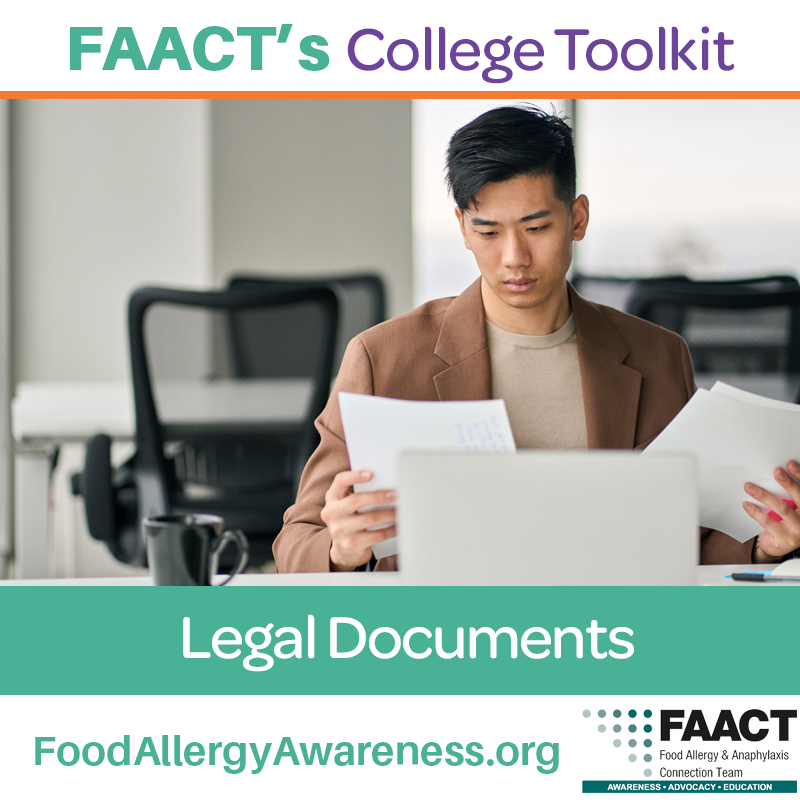
Legal Documents
In addition to accommodation plans, it is also important to determine what legal documents you may want to prepare prior to your child heading off to college. Typically, once your child has legally reached adulthood (either age 18 or 21, depending on the state), you will no longer have control over your child’s health, school, and financial records. Speak with your student about how these legal documents might be beneficial for everyone.
- Heath Care Power of Attorney or Health Care Proxy
As the parent or caregiver of a student with food allergies, remaining informed about your child’s health and being able to make healthcare decisions for your child if they cannot is important. A Health Care Power of Attorney (POA) or Health Care Proxy is designed to allow just this. It not only waives the privacy rights provided under the Health Insurance Portability and Privacy Act (HIPAA) to allow the parent to discuss the student’s medical conditions with health care providers, but it also gives the parent authority to make health care decisions for the student when he or she is unable to do so.
If the student is attending school out of state, it is a best practice to prepare two Health Care POAs or Proxies, one in the student’s home state and one in the state in which the student is attending school. Additionally, some colleges and universities may have their own preferred Health Care Proxy form. - Durable Legal Power of Attorney
As the parent or caregiver of a college student, it is often necessary to access the student’s finances to pay bills and handle insurance matters. A Durable Legal Power of Attorney is a document by which the student authorizes the parent or caregiver to handle the student’s financial affairs. Typically, it is only necessary to prepare and file a Durable Legal Power of Attorney in the student’s home state/permanent place of residence.
These legal documents may sound excessive for a student simply heading off to college, but they are critical if your student is incapacitated in any way. Power of Attorney is also useful if your student plans to travel or study abroad. - Access to Student Records
Once a student reaches age 18, the student’s educational records may be considered private and may no longer be accessible to parents. Your student’s school should have a form for your student to complete that would allow the school to release grades and disciplinary records to you. These forms vary from school to school and should be obtained from your child’s school directly.
Speak with your student about whether they would be comfortable completing the necessary access forms. It is your child’s right to grant or deny you this access to these records.

